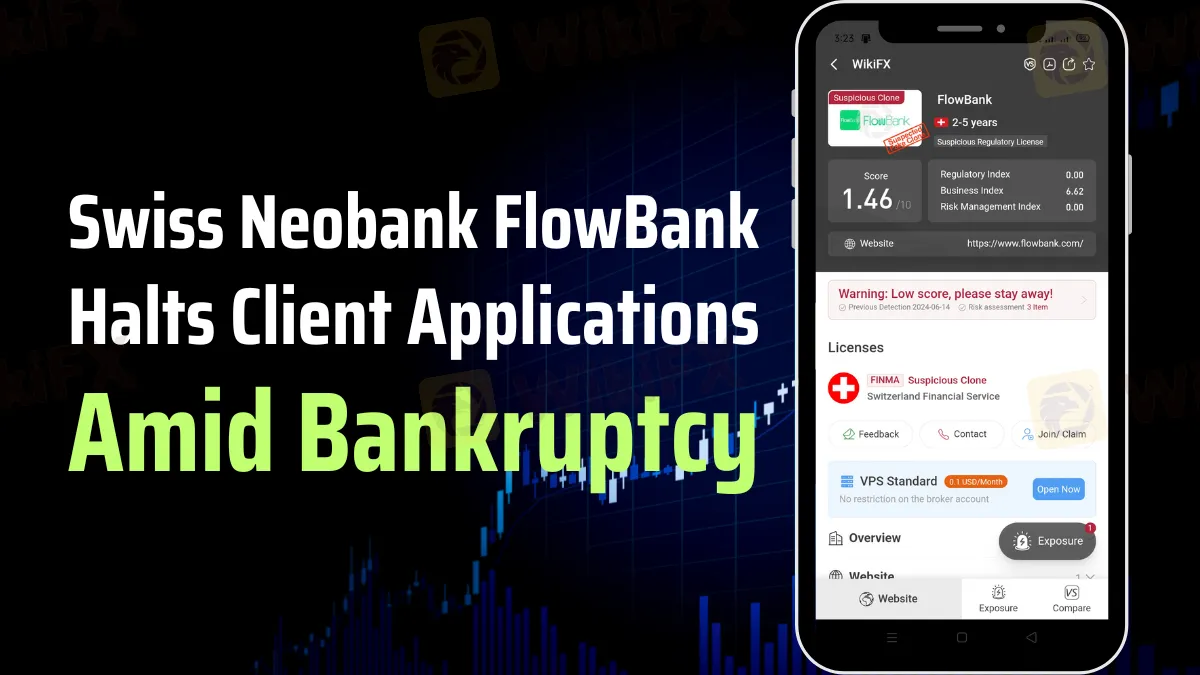简体中文
繁體中文
English
Pусский
日本語
ภาษาไทย
Tiếng Việt
Bahasa Indonesia
Español
हिन्दी
Filippiiniläinen
Français
Deutsch
Português
Türkçe
한국어
العربية
Swiss Neobank FlowBank Halts Client Applications Amid Bankruptcy
Abstract:Swiss neobank FlowBank stops new client applications and onboarding as financial regulator FINMA initiates bankruptcy proceedings.

FlowBank, a Swiss online neobank, unexpectedly ceased accepting new customer applications and stopped providing client onboarding. This comes following the announcement earlier today that the bank will be filing for bankruptcy by the Swiss financial authority, FINMA.
While FlowBank's primary website is still up and running, a maintenance notice has been added to the “Open an Account” page informing users that the onboarding procedure is now not accessible. Customers who need help opening an account can get in touch with customer support.

CEO Charles-Henri Sabet founded FlowBank in 2020, with an initial emphasis on banking and investing operations. It has, however, just changed its emphasis to online CFD trading, which was akin to Sabet's prior business endeavor, London Capital Group Ltd (LCG). The cryptocurrency investment firm CoinShares owns a sizeable 30% of FlowBank's ownership.
Concerns about FlowBank's financial stability led FINMA to decide to file the bank for bankruptcy. The regulator disclosed that FlowBank may be overindebted and no longer satisfies the minimal capital criteria required for its operations. With preliminary estimates showing that FlowBank's “privileged deposits” may be completely reimbursed from the bank's available cash, this step seeks to safeguard depositors.

It's still unclear how FlowBank's insolvency would affect LCG, a subsidiary. Despite not having submitted its 2022 financial accounts—which are late by over six months—LCG is purportedly in good standing and has a separate license from the UK's Financial Conduct Authority (FCA).
The group also comprises LCG Capital Markets Limited, an offshore company based in the Bahamas, and London Capital Group (Cyprus) Ltd, a company whose CySEC license was revoked in 2021.
The demise of FlowBank is the second big blow to neobrokers in Europe in less than a year. Due to ongoing losses, Amsterdam-based BUX was sold to ABN Amro in the latter part of last year. The demise of FlowBank highlights the financial risks that may occur in the quickly changing digital banking ecosystem and adds to the expanding list of issues affecting the neobank industry.
Stakeholders and customers are waiting for more information as it develops on FlowBank's bankruptcy procedures and the implications for the neobanking sector as a whole.
You may also access the latest news in the financial market here.

Disclaimer:
The views in this article only represent the author's personal views, and do not constitute investment advice on this platform. This platform does not guarantee the accuracy, completeness and timeliness of the information in the article, and will not be liable for any loss caused by the use of or reliance on the information in the article.
Read more

Malaysian-Thai Fraud Syndicate Dismantled, Millions in Losses Reported
The Royal Malaysia Police (PDRM) has received 26 reports concerning the Nicshare and CommonApps investment schemes, both linked to a major fraudulent syndicate led by a Malaysian citizen. The syndicate’s activities came to light following the arrest of its leader by Thai authorities on 16 December.

WikiFX Review: Is FxPro Reliable?
Founded in 2006, FxPro is a reputable UK-based broker, trading on various market instruments. In this article, we will help you find the answer to one question: Is FxPro reliable?

WikiFX Review: Something You Need to Know About Markets4you
Markets4you, is a global forex broker launched in 2007. It was established in the British Virgin Islands. This broker offers its global traders various market instruments.

SEC Approves Hashdex and Franklin Crypto ETFs on Nasdaq
The SEC has approved crypto index ETFs by Hashdex and Franklin Templeton, including Bitcoin and Ethereum, marking a milestone in crypto asset investment.
WikiFX Broker
Latest News
ASIC Sues Binance Australia Derivatives for Misclassifying Retail Clients
Geopolitical Events: What They Are & Their Impact?
Top 10 Trading Indicators Every Forex Trader Should Know
WikiFX Review: Is FxPro Reliable?
Malaysian-Thai Fraud Syndicate Dismantled, Millions in Losses Reported
Trading frauds topped the list of scams in India- Report Reveals
Why Do You Feel Scared During Trade Execution?
Revolut Leads UK Neobanks in the Digital Banking Revolution
Fusion Markets: Safe Choice or Scam to Avoid?
SEC Approves Hashdex and Franklin Crypto ETFs on Nasdaq
Currency Calculator


